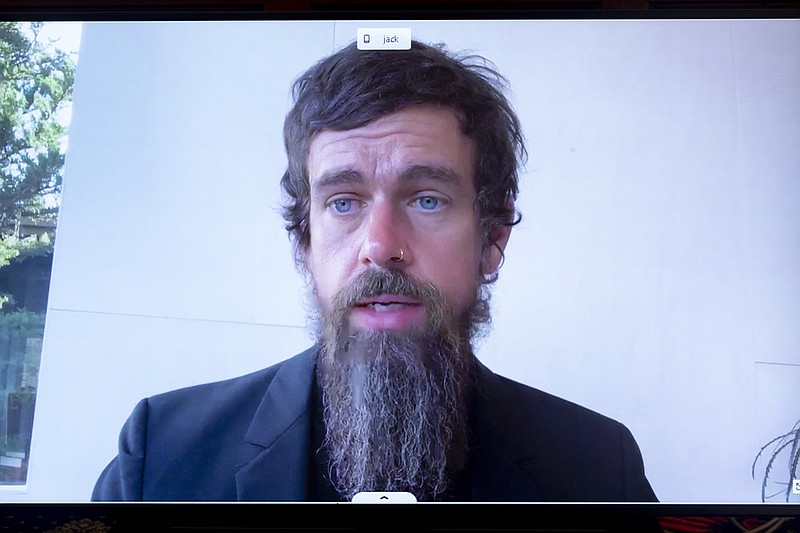We've lost count the number of times Facebook CEO Mark Zuckerberg and Twitter CEO Jack Dorsey have been hauled in front of Senate committees about their regulation of social media content.
Each of the hearings seems to run along the same lines. Senators ask the executives pointed questions about their policies and procedures, citing specific instances in which implicit bias has been shown, usually - but not always - against Republicans, conservatives and President Donald Trump. The executives dodge and wiggle, hem and haw, avoid direct answers and eventually tell the senators they're not really regulating content, but if they are, it is for the good of all users. The hearing ends, and the social media platforms continue doing exactly what they had been doing.
We appreciate the senators attempting to hold the feet of Big Tech to the fire because a potential President Joe Biden and a potentially Democrat-controlled Senate (with the vote of a potential Democratic vice president) won't be bothered with it. Why kill the golden goose, after all?
But if no action is ever taken, outside of keeping the issue before the public, what good are the hearings?
It's not like the companies, who are run by Democrats, populated with Democratic workers and support Democratic causes and candidates, are ever going to reverse their biases and start supporting conservative causes. They're not even going to attempt a level playing field unless they're forced to.
But therein lies the problem. As Senate Judiciary Committee Chairman Lindsey Graham, R-South Carolina, explained at yet another such hearing last week, "I don't want the government to take over the job of telling America what tweets are legitimate and what are not. I don't want the government deciding what content to take up and put down. I think we're all in that category. But when you have companies that have the power of governments and have far more power than traditional media outlets, something has to give."
Last week's hearing, according to Graham, was to provide senators with more information to evaluate Section 230 of the Communications Decency Act, which grants platforms like Twitter and Facebook immunity from liability for third-party content.
Currently, the social media platforms host thousands of false posts and statements. When the false posts and statements attack Trump, Republicans or conservatives, they are rarely scrutinized. When statements are made by Trump, Republicans or conservatives, they are often flagged, given content warnings or removed altogether.
Dorsey, incredibly, said such a policy promotes free speech. He said that by removing or labeling content considered as abusive or misleading, users are reassured and thus trust Twitter that they are allowed to "express themselves."
However, this is no different from college officials controlling campus speakers, refusing to allow individuals with opinions different from theirs in order that students with similar opinions will feel safe.
Such opinions are dangerous and threaten to plunge the country into a new McCarthyism, if we're not there already.
Among those lecturing the Big Tech heads last week was Sen. Marsha Blackburn, R-Tennessee. Her comments that the companies have used Section 230 "to run amok," "silence conservatives" and use an "un-American blacklist" were accurate but ultimately of little use if no action is taken.
Nevertheless, we believe the state's junior senator should continue to seek more action in this arena and spend less time worrying about entities such as the "sister city" cultural partnerships between U.S. and Chinese cities. She charged last week that China was using the partnerships to achieve "geostrategic goals," and she has sponsored a bill that would order the Government Accountability Office to examine the relationships.
If friendship dinners with a few tables of senior citizens hearing about Chinese customs are accomplishing "geostrategic goals," maybe she has a point. But, where China is concerned, we'd rather have her pushing the U.S. to get its financial house in order since our country's debt to the Asian giant was $1.07 trillion as of July.
But we digress.
Blackburn mentioned in the hearing the Online Freedom and Viewpoint Diversity Act, which she introduced in September with Graham and Sen. Roger Wicker, R-Mississippi. It would clarify the original intent of Section 230 and increase accountability for content moderation practices. She said the bill is ready for markup, which is the process through which committees and subcommittees debate, amend and rewrite proposed legislation.
If the CEOS don't control their content moderation policies, she said, the Senate will need to get involved.
The truth is the Big Tech chiefs aren't going to change without a push. Whether a Republican Senate can move such a bill to a vote, and how it would fare across both Houses of Congress, is unclear. But if nothing is done, look for yet another hearing with a lot of finger-pointing and an equal amount of evasion in the near future.
